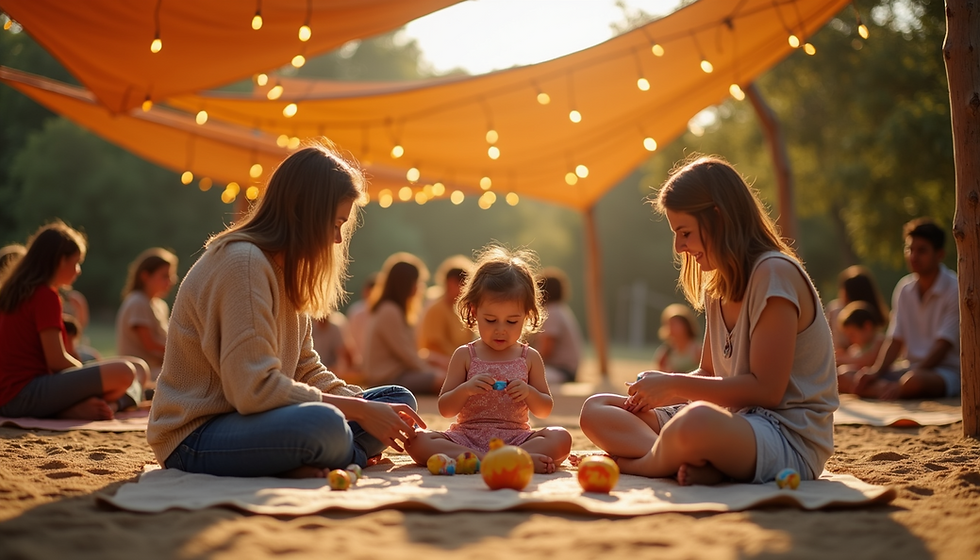Parenting Today: Why It Feels So Hard—and What We Can Do Together
- Ziska Maria
- Jun 2, 2025
- 3 min read
Updated: Aug 25, 2025
If you’ve ever found yourself lying awake at night wondering why parenting feels so overwhelming, you’re not alone. Across the country, moms, dads, and caregivers are reporting record levels of stress, exhaustion, and burnout. In fact, earlier this year the U.S. Surgeon General released a report confirming what so many parents already know deep down: parenting today can take a serious toll on mental health (U.S. Department of Health and Human Services, 2025).

At Grow Together WNC, we believe this truth is not an indictment of parents—it’s a call to action for communities. Families are being asked to carry more than any one household was ever meant to hold: economic uncertainty, the lasting impacts of COVID, the trauma of natural disasters like Hurricane Helene here in Western North Carolina, and the cultural shifts reshaping childhood itself.
The Anxious Generation: Childhood Rewired
Psychologist Jonathan Haidt’s book The Anxious Generation (2024) highlights how childhood itself has changed in just the last decade. Instead of afternoons of free play, kids are increasingly tethered to phones and social media. Research shows this shift correlates with a dramatic rise in youth anxiety, depression, and self-harm (Haidt, 2024; Twenge, 2017).
For parents, that means not just raising children, but also navigating a digital experiment that few families were prepared for. As Haidt puts it, childhood has been “rewired”—and parents are left holding the responsibility for managing the fallout.
The Layered Challenges Families Face
Post-COVID Realities
The pandemic didn’t just disrupt schedules; it fundamentally reshaped family life. Globally, depression and anxiety increased by more than 25% in the early pandemic years (WHO, 2022), with ripple effects still felt in both parents and children (Racine et al., 2021).
Natural Disasters and Local Trauma
Closer to home, Hurricane Helene continues to affect families across WNC. Research shows natural disasters often heighten child anxiety and parental stress, especially when families face displacement or economic strain (Masten & Osofsky, 2010).
Economic Pressure
Rising rents, childcare shortages, and food insecurity add layers of stress. Chronic financial strain has been shown to erode mental health, increase conflict at home, and limit the energy parents have left for connection and play (Conger et al., 2010).
Parenting as a Public Health Concern
The Surgeon General’s warning reframes parenting not as a private burden but as a public health issue. Parents aren’t failing—systems are failing parents. Without community supports and systemic changes, the chronic stress of caregiving harms both adults and the children who rely on them.
How Grow Together WNC Responds
This is where grassroots community work matters. At Grow Together WNC, we bring families together through art, music, movement, and play. These aren’t luxuries—they’re evidence-based practices that help regulate the nervous system, restore joy, and heal collective trauma (Porges, 2011; Fancourt & Finn, 2019).
Our “Hope Takes Flight” butterfly art events, drum circles, and family movement gatherings create space for children and parents to reconnect—not just with each other, but with the larger community. Every mural painted, every song sung, and every moment of laughter is an act of resilience.
What We Can Do Together
If parenting today feels harder than ever, that’s because it is. But there’s hope when we respond together. We invite you to:
Join us at a community event. Bring your family to create, play, and connect.
Partner with us. Local artists, healers, and organizations are welcome to collaborate.
Support our mission. Donations go directly into free, accessible community art, music, and movement events for families in WNC.
Parenting was never meant to be a solo act. Together, we can weave a stronger fabric of care—one where families don’t just survive, but truly thrive.
References
Conger, R. D., Conger, K. J., & Martin, M. J. (2010). Socioeconomic status, family processes, and individual development. Journal of Marriage and Family, 72(3), 685–704.
Fancourt, D., & Finn, S. (2019). What is the evidence on the role of the arts in improving health and well-being? WHO Regional Office for Europe.
Haidt, J. (2024). The Anxious Generation: How the Great Rewiring of Childhood Is Causing an Epidemic of Mental Illness. Penguin Press.
Masten, A. S., & Osofsky, J. D. (2010). Disasters and their impact on child development. Child Development, 81(4), 1029–1039.
Porges, S. W. (2011). The Polyvagal Theory. W.W. Norton.
Racine, N., McArthur, B. A., Cooke, J. E., Eirich, R., Zhu, J., & Madigan, S. (2021). Global prevalence of depressive and anxiety symptoms in children and adolescents during COVID-19. JAMA Pediatrics, 175(11), 1142–1150.
Twenge, J. M. (2017). iGen. Atria Books.
U.S. Department of Health and Human Services, Office of the Surgeon General. (2025). Parents Under Pressure: Mental Health and Well-Being of Parents.
World Health Organization. (2022). COVID-19 pandemic triggers 25% increase in prevalence of anxiety and depression worldwide.


Comments